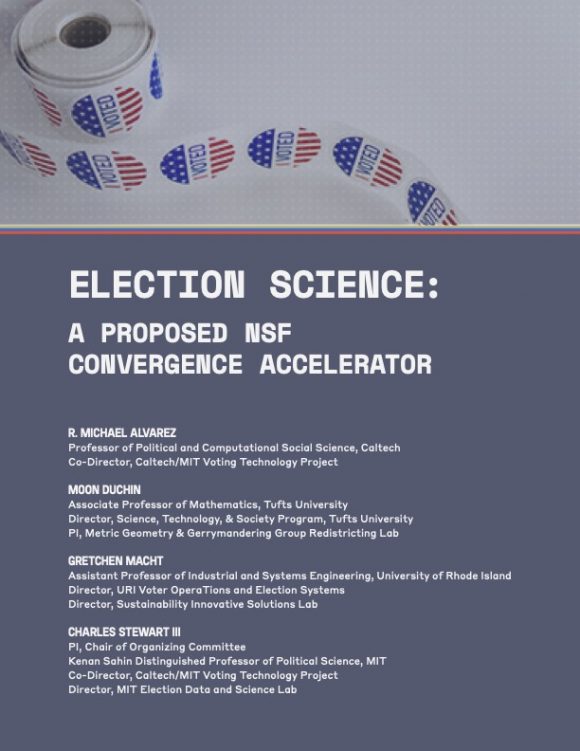It’s really exciting to write that our report to the National Science Foundation’s Convergence Accelerator (NSF-CA) program, “Election Science: A Proposed NSF Convergence Accelerator” is now available. In this report, we argue that there are fourteen research challenges present critical opportunities for NSF-CA funding.
This report was produced with support from the NSF-CA, and my co-authors (or in NSF lingo, co-Principal Investigators, or “PIs”) on the project are Moon Duchin (Tufts University), Gretchen Macht (University of Rhode Island) and Charles Stewart III (MIT). It was a fun and productive experience working with Moon, Gretchen and Charles.
The project started with a number of brainstorming meetings among the co-PIs, and we thought long and hard about what we each identified as the important research opportunities in election science, challenges that were would require collaborations between technology providers, election officials, and academics — and challenges that if appropriately funded, might be solved within a few years.
We started with a first virtual workshop, which had an innovative format. The co-PIs invited a number of election officials from across the United States, representing different types of election jurisdictions, to sit down with one of us and discuss the pain points that they have experienced in recent election cycles, especially during the 2020 election. We also discussed with them the research priorities that the co-PIs had identified and got their input and feedback on those. We recorded these conversations, which was a unique experience, as it’s rare for academics like us to have the chance to sit with some of the most innovative election officials in the world and have an extended conversation about their experiences and what they think academics can do to help improve American election administration and technology.
These recorded conversations, then, were made available to the participants in four virtual workshops held this spring. Workshop participants represented the diversity of experiences and opinions about election administration and election science: academics (both experts in election science and those new to the area), election officials, technology providers, government officials, and stakeholders.
These four workshops spanned four days and sixteen hours, involving intensive large group, small group, and even one-on-one conversations, as we tried to narrow down the set of research challenges and find areas where there was consensus among the workshop participants about the importance and viability of each potential research challenge. In the end, the co-PIs were able to narrow down the list to fourteen research challenges, each of which is both “convergent” (in the sense that they require active collaboration between academics, and both the private and public sectors) and “ripe for acceleration” (in the sense that with appropriate funding solutions could be build in a short period of time.
The fourteen challenges are:
- Evaluating Tools for Election Administration
- Ensuring Usability within the Voting Experience
- Improving Access to Voting
- Communicating Effectively with the Electorate
- Detecting Anomalies in Election Management Systems
- Sharing Election Results for Research, Dissemination, and Anomaly Detection
- Visualizing Election Data
- Enhancing Voter Identity Verification
- Securing Electronic Ballot Delivery & Return
- Implementing End-to-End Verifiability
- Improving Cybersecurity for Election Administration
- Managing Election Geography
- Promoting Sustainable and Scalable Sharing of Election Technology
- Developing Next-Generation Voting Technologies
I encourage you to take a closer look at the report to learn more about why we identified each as an important research challenge.
So what happens next? Our report is now being reviewed by the NSF-CA, along with the reports from a number of other NSF-CA initiatives that they supported in this year’s cycle of studies. We hope that the NSF-CA decides that supporting these research challenges in the near future is an important priority, and if they do, that our initiative will move to the next stage of development at the NSF-CA.
I want to again thank the many busy people who took time this spring to work with us to help develop this agenda for accelerating research on election science. We learned a great deal from our workshop participants, and while we were forced to meet virtually because of the pandemic, we put the technology to good used and were able to meet new and get to know people passionate about advancing election science. Finally, I want to thank my co-PIs for a great opportunity to work with them, I learned a great deal about aspects of election administration and technology because of our collaboration.
